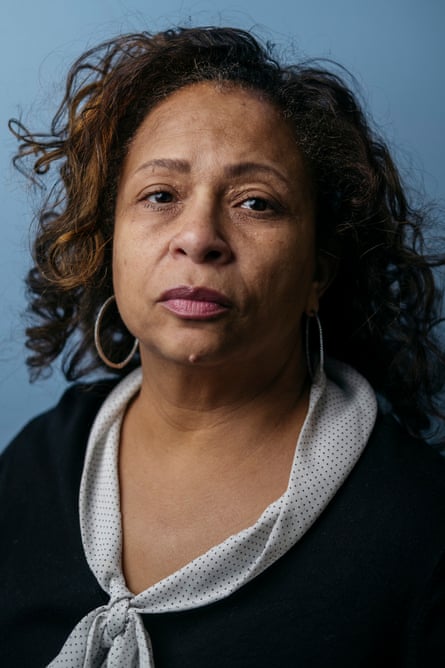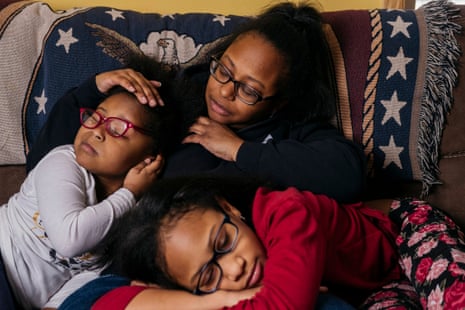Kaiesha Rivers slowly lowered her aching body into her bathtub. It had been an exhausting day and all she wanted to do was relax. But a few minutes into soaking, she felt a rush of cold water down her leg followed by a deep pain in her cervix.
“This can’t be,” Rivers thought. “Not again.” Her water broke. She was going into labor at 32 weeks, two months before her due date.
Instead of unwinding, Rivers found herself lying in the backseat of her aunt’s brand new Cadillac, being rushed to the hospital. Despite promptly informing medical staff that she was in labor, Rivers was taken to registration to fill out paperwork instead of a delivery room.
“I’m in labor,” she repeated to the intake nurse, who tuned out her pleas. After four previous pregnancies, Rivers, then in her mid-20s, had grown accustomed to hospital staff ignoring her and treating her disrespectfully.
Half an hour later, Rivers was still in a wheelchair at the registration desk. “Don’t push,” a nurse said as she passed. Another nurse saw that blood was running down Rivers’ leg. She asked Rivers to stand up so they could put pads beneath her. Then the nurse saw the baby’s head begin to crown.
“Take her to labor and delivery,” Rivers’ aunt yelled to hospital staff. Instead, nurses took her to triage. Minutes later, before her doctor arrived, Jyahri Pye was born. At just over four pounds, Pye became one out of every 10 infants born prematurely in the United States.

Rivers, 39, has had nine miscarriages in 14 years, and one baby who died at six months. She says the loss left her feeling worthless.
“It made me feel like my body wasn’t equipped to birth a child or even to carry one,” Rivers says. “I labeled myself the black widow spider after I had my fourth miscarriage. A black widow has babies and then she eats them.”
Rivers is far from alone in her loss. Of the 100 largest American cities, Detroit leads the nation in premature births – the leading cause of black infant death.
Black infants die from premature birth at a rate more than twice that of the rest of the United States. Eighty-three per cent of Detroit’s residents are African American, and the preterm birth rate among black women in Michigan is 55% percent higher than the rate among all other women in the state.
If there is success of a live birth, babies in Detroit are still at higher risk of death – 15 of every 1,000 babies born there die before their first birthday, compared with the national average of six.
According to the National Institute of Health, women residing in economically deprived areas – Detroit qualifies, with more than 50% of children living below poverty level and an unemployment rate more than double the national average – are at increased risk of preterm birth.
But in Detroit, the deprivation is even more extreme. Black mothers also face mass water shut-offs, hospitals deserts and stress from economic racism.
According to the March of Dimes, an organization which closely tracks infant mortality, “high levels of continuous stress can cause health problems, such as high blood pressure and heart disease. When you’re pregnant, this type of stress can increase the chances of having a premature baby or a low-birthweight baby.”
Dr Keisha Bentley-Edwards, professor and researcher at Duke University, has been studying stress from racism and its impact on black people for almost 15 years. “The culmination of everyday racial slights, institutional racism that can impact employment, and access to quality care influence bodily functioning,” Bentley-Edwards says. “Stress from racism is detrimental to black women and their babies while still in their mother’s womb.”

Abandoned and burnt-out homes line many streets in Detroit, and large swaths of land where communities once thrived now sit barren. Buildings that were once banks house makeshift churches, and liquor stores masquerade as supermarkets. What you won’t see are well-lit grocery stores with fresh fruits and vegetables, or mass transit.
What’s missing most crucially, however, are hospitals and clinics – 65% of Detroit’s population lives in medically underserved areas. Only four hospitals exist to serve a population of roughly 670,000. Of other cities with similar populations, Boston has nine hospitals, Nashville has 13 and El Paso has 10.
“When you subtract the hospital, you subtract the emergency room, and the inpatient care, patients are less likely to go to the doctor,” says Alan Sager, professor of health law, policy and management at Boston University School of Public Health. Sager has been researching hospital closures in urban areas for more than four decades.
Travel times go up, patient wellbeing goes down, and that problem is magnified because urban residents and African American residents, in particular, rely heavily on hospital-provided physician care, Sager says.

Without hospitals, Detroit residents are left with few resources. “Relatively few doctors in private practice maintain offices in African American neighborhoods. White patients are more likely to live in places with more doctors in office-based private practices,” Sager says. “Hospitals have been more willing and able than doctors in private practice to serve African American patients in their ERs and in their outpatient clinics.
Seven months ago, Sarah (whose name has been changed for anonymity) walked into her kitchen to get a glass of water. Nothing came out of the tap. She checked the bathroom. No water there either. Her water had been shut off.
Sarah’s house was one of the more than 112,000 homes in Detroit to have had their water supply cut off by city government since 2014.
Two months pregnant with twins, Sarah was stunned. She was diligent about her bills and made sure the landlord received his payment on time every month.
In a panic, Sarah called the city’s water and sewerage department to find out why she had no running water. They informed her that the amount due was more than $700. Her landlord hadn’t made payments in months.

Detroit’s high water rates have become unaffordable for many residents. In Sarah’s case, a doctor’s note may have provided a 21-day extension, but without the money to pay the bill, the shutoff was imminent.
The strain from days of not having running water began to affect Sarah’s pregnancy. At one of her prenatal appointments, the doctor informed her that her fetuses were not developing. “It’s related to stress. Me just worrying, not eating. I have to take steroids just to make them [the twins] grow due to the lack of water.” Sarah says.
Not having running water while pregnant is dangerous, says former OB/GYN specialist Dr Paul von Oeyen. Pregnancy is already a high-risk condition for dehydration because many women experience nausea and vomiting in early pregnancy, and because pregnant women can be more susceptible to infections.”
“The fetus develops in the uterus, in amniotic fluid. Severe dehydration could create a problem with that,” says Von Oeyen, who worked at William Beaumont hospital in neighboring Royal Oak, Michigan. “Dehydration has been associated with premature labor. Premature labor is the greatest cause of infant mortality.”

As an OB/GYN who specialized in high-risk pregnancy cases, Von Oeyen says he’s shocked by Detroit’s water shutoffs. “It’s a public health hazard. Detroit is in the midst of the worst hepatitis A outbreak in the United States. It’s like you’re forcing people to live in conditions like those in underdeveloped countries.”
Without money to pay the $700 bill and no one who could help, Sarah, a mom of six, had no choice but to go to the Brightmoor Connection food pantry for help getting bottled water.
The Rev Rosalyn Murray-Bouier manages the Brightmoor Connection food pantry. About a year ago Murray-Bouier noticed that more and more families were asking for bottles of water. It didn’t surprise her. She knew Detroiters had been getting their water shut off for four years; now it was happening in her neighborhood.
“City government isn’t concerned with its people. Nothing creates an exception from them turning the water off,” she says. “Not having cancer, not having babies, nothing – what they’re doing, that’s the evil in the room.”

Getting water and managing her water supply became Sarah’s daily focus. On top of getting water bottles from the food pantry, she also went regularly to an aunt’s home to fill up empty jugs. She had to collect enough to use daily and have extra for any emergency.
“It takes three 24-cases of water to fill [the bathtub] up enough to where you can bathe six kids real fast in and out,” Sarah says.
At night, when the kids were asleep, Sarah would cry. “I have to stay strong in front of them,” Sarah says. “But I cried because I’m pregnant.”
After two months without water, an uncle pitched in to help Sarah pay her bill. But the problems didn’t end. The flow came back on, but weeks of sitting in rusty pipes had tainted the water.
“I’m still not able to drink, cook with it, wash off my meat,” Sarah says. “It still has rust. You can smell it. It smells like sewer.”
For five months brown water ran from the pipes in Sarah’s home. The family sometimes drank the water but stopped after Sarah’s four-year-old, who is epileptic, began having frequent seizures, and her youngest daughter’s tongue started to peel.
After two months with no water and five months with brown water that smelled like sewage, the city of Detroit finally sent someone to clean the pipes in October.
Her twins were also at risk of not growing properly, which can lead to preterm birth, by the stress Sarah endured just trying to access water every day.

On a recent visit to the food pantry, Sarah tells Murray-Bouier that things are slowly starting to get back to normal. She says that she and her children can now bathe daily and that she can cook without fear of contaminating her food.
Sarah gave birth on 22 November. Her twins are fine. She says she tries not to worry about them and “just let God handle it. He knows what’s best, and he knows it wasn’t my fault so I feel like I’ll be alright.”
Still, Sarah is conflicted and frustrated by the treatment she received from the city of Detroit. “What I can’t understand is why the city would allow something like this,” Sarah says. “Why would you want to do somebody like that, instead of helping them?”
